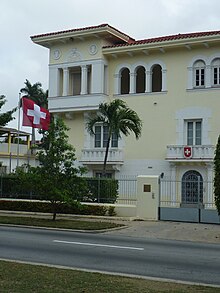
Back دولة حامية Arabic Schutzmacht German Poder protector Spanish Suojeluvaltio Finnish Puissance protectrice French מעצמה מעניקת חסות HE रक्षा शक्ति HI Negara pelindung ID Potenza protettrice Italian 利益代表国 Japanese

A protecting power is a country that represents another sovereign state- the protected power- in a third country where the protected power lacks its own formal diplomatic representation (e.g., lacks an embassy or consulate).[2] It is common for protecting powers to be appointed when two countries break off diplomatic relations with each other. The protecting power is responsible for looking after the protected power's diplomatic property and citizens in the hosting state. If diplomatic relations were broken by the outbreak of war, the protecting power will also inquire into the welfare of prisoners of war and look after the interests of civilians in enemy-occupied territory.
The institution of protecting power dates back to the Franco-Prussian War of 1870 and was formalized in the Geneva Convention of 1929. Protecting powers are authorized in all four of the Geneva Conventions of 1949. In addition to sovereign states being appointed as protecting powers, the International Committee of the Red Cross may be appointed a protecting power under Protocol I (1977). The practice of selecting a protecting power in time of peace was formalized in the Vienna Convention on Diplomatic Relations (1961).[3][4]
- ^ (in French) Stéphane Bussard, "La voix suisse des États-Unis à Cuba se tait", Le Temps, Monday 20 July 2015.
- ^ Cite error: The named reference
blake1990was invoked but never defined (see the help page). - ^ "Vienna Convention on Diplomatic Relations" (PDF). United Nations. 18 April 1961.
- ^ U.S. Department of State Foreign Affairs Manual. 7 FAM 1020.
{{cite book}}: CS1 maint: location (link)